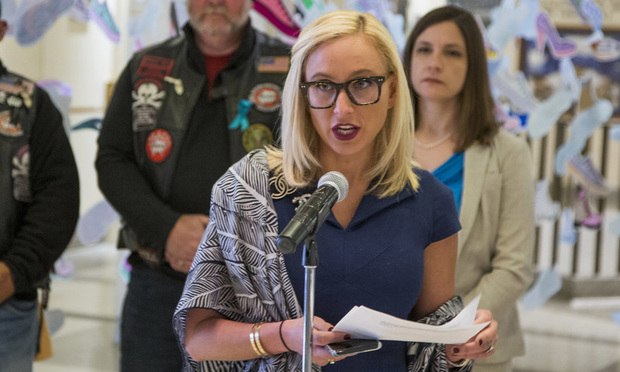Police, Firefighter PTSD Benefits Go to Governor's Desk
Firefighters, police officers and EMTs who cannot work due to job-related post-traumatic stress disorder could qualify for expanded benefits under a bill heading to Gov. Rick Scott.
March 06, 2018 at 03:24 PM
4 minute read

Firefighters, police officers and EMTs who cannot work due to job-related post-traumatic stress disorder could qualify for expanded benefits under a bill heading to Gov. Rick Scott.
The House unanimously approved the measure (SB 376) Monday, two days after the Senate passed it. Scott is expected to sign the bill, spearheaded by Sen. Lauren Book, D-Plantation, and Rep. Matt Willhite, D-Wellington.
Matt Puckett, executive director of the Florida Police Benevolent Association, said the changes in the bill can go a long way toward helping first responders and predicted that it would even save lives.
In Florida, injured workers are prevented from receiving workers' compensation insurance benefits — either medical benefits or lost wages — for mental or nervous injuries not accompanied by physical injuries.
The law was changed in 2007, though, to allow first responders to obtain medical benefits for PTSD without having accompanying physical injuries. However, they still are precluded from obtaining lost wages for PTSD.
The bill would change that if police officers, firefighters, emergency-medical technicians and paramedics meet certain criteria.
First responders who have witnessed the death of a minor or witnessed a death that involved “grievous bodily harm of a nature that shocks the conscience” could file workers' compensation claims for lost wages. The first responders would be required to show by clear and convincing evidence that the events were the source of the PTSD.
The bill also would require cities, counties and other entities that employ first responders to provide educational training related to mental health awareness, prevention, mitigation and treatment.
PTSD is a psychiatric disorder that can occur in people who have experienced or witnessed traumatic events. Symptoms generally begin within the first 3 months after the trauma, although there may be delays of months or even years before the criteria for the diagnosis are met, according to a staff analysis of the bill.
Before the House voted to pass the bill Monday, Rep. Erin Grall shared a suicide letter written by an Indian River County fire-rescue chief and posted on Facebook.
“Twenty-seven years of deaths and babies dying in your hands is a memory that you will never get rid of. It haunted me daily until now. My love to my crews be safe take care. I love you all,” Grall read through tears, noting that the chief was her husband's cousin and brotherlike figure.
“Until something like this happens so close, you don't realize the deficiencies in the system,” Grall said, discussing how first responders can be impaired by the work they do.
Puckett, said the bill takes a “giant step” in helping first responders address PTSD associated with their jobs.
Puckett hopes the training and education will make family members and co-workers more aware about the warning signs of PTSD and can encourage treatment to prevent the disorder from rising to the level that it prevents first responders from being able to work.
“Are we identifying folks with this? Are family members, co-workers able to identify that this person is exhibiting these PTSD signs, and are we setting it up to where people are actually willing to admit it?” Puckett said. “Maybe with this legislation people will start seeking treatment sooner.”
A 2015 survey of 4,000 first responders found that 6.6 percent had attempted suicide, which is more than 10 times the rate in the general population.
Florida Chief Financial Officer Jimmy Patronis, who supported the bill through the process, issued a statement saying he was proud that Florida changed the law.
“First responders show up for us every day, without hesitation or questioning our politics, and today Florida showed up for them,” said Patronis, whose job includes serving as state fire marshal.
Patronis also took a shot at the Florida League of Cities in the statement, saying “to those who refused to support this measure from the beginning: we got this done without you.”
The Florida League of Cities initially opposed the legislation, contending it was too broadly written and could increase insurance costs for cities that employ police and firefighters. The League of Cities, however, dropped its opposition to the bill, pointing last week to an amendment that eased its concerns.
Christine Sexton reports for the News Service of Florida.
This content has been archived. It is available through our partners, LexisNexis® and Bloomberg Law.
To view this content, please continue to their sites.
Not a Lexis Subscriber?
Subscribe Now
Not a Bloomberg Law Subscriber?
Subscribe Now
NOT FOR REPRINT
© 2025 ALM Global, LLC, All Rights Reserved. Request academic re-use from www.copyright.com. All other uses, submit a request to [email protected]. For more information visit Asset & Logo Licensing.
You Might Like
View All

Holland & Knight Expands Corporate Practice in Texas With Former Greenberg Traurig Partner
3 minute read
Forum Clause Axes $844M Case Against Reinsurer Over Deadly Plane Crash, Judge Rules

Latest Boutique Combination in Florida Continues Am Law 200 Merger Activity
3 minute readTrending Stories
- 1Thursday Newspaper
- 2Public Notices/Calendars
- 3Judicial Ethics Opinion 24-117
- 4Rejuvenation of a Sharp Employer Non-Compete Tool: Delaware Supreme Court Reinvigorates the Employee Choice Doctrine
- 5Mastering Litigation in New York’s Commercial Division Part V, Leave It to the Experts: Expert Discovery in the New York Commercial Division
Who Got The Work
J. Brugh Lower of Gibbons has entered an appearance for industrial equipment supplier Devco Corporation in a pending trademark infringement lawsuit. The suit, accusing the defendant of selling knock-off Graco products, was filed Dec. 18 in New Jersey District Court by Rivkin Radler on behalf of Graco Inc. and Graco Minnesota. The case, assigned to U.S. District Judge Zahid N. Quraishi, is 3:24-cv-11294, Graco Inc. et al v. Devco Corporation.
Who Got The Work
Rebecca Maller-Stein and Kent A. Yalowitz of Arnold & Porter Kaye Scholer have entered their appearances for Hanaco Venture Capital and its executives, Lior Prosor and David Frankel, in a pending securities lawsuit. The action, filed on Dec. 24 in New York Southern District Court by Zell, Aron & Co. on behalf of Goldeneye Advisors, accuses the defendants of negligently and fraudulently managing the plaintiff's $1 million investment. The case, assigned to U.S. District Judge Vernon S. Broderick, is 1:24-cv-09918, Goldeneye Advisors, LLC v. Hanaco Venture Capital, Ltd. et al.
Who Got The Work
Attorneys from A&O Shearman has stepped in as defense counsel for Toronto-Dominion Bank and other defendants in a pending securities class action. The suit, filed Dec. 11 in New York Southern District Court by Bleichmar Fonti & Auld, accuses the defendants of concealing the bank's 'pervasive' deficiencies in regards to its compliance with the Bank Secrecy Act and the quality of its anti-money laundering controls. The case, assigned to U.S. District Judge Arun Subramanian, is 1:24-cv-09445, Gonzalez v. The Toronto-Dominion Bank et al.
Who Got The Work
Crown Castle International, a Pennsylvania company providing shared communications infrastructure, has turned to Luke D. Wolf of Gordon Rees Scully Mansukhani to fend off a pending breach-of-contract lawsuit. The court action, filed Nov. 25 in Michigan Eastern District Court by Hooper Hathaway PC on behalf of The Town Residences LLC, accuses Crown Castle of failing to transfer approximately $30,000 in utility payments from T-Mobile in breach of a roof-top lease and assignment agreement. The case, assigned to U.S. District Judge Susan K. Declercq, is 2:24-cv-13131, The Town Residences LLC v. T-Mobile US, Inc. et al.
Who Got The Work
Wilfred P. Coronato and Daniel M. Schwartz of McCarter & English have stepped in as defense counsel to Electrolux Home Products Inc. in a pending product liability lawsuit. The court action, filed Nov. 26 in New York Eastern District Court by Poulos Lopiccolo PC and Nagel Rice LLP on behalf of David Stern, alleges that the defendant's refrigerators’ drawers and shelving repeatedly break and fall apart within months after purchase. The case, assigned to U.S. District Judge Joan M. Azrack, is 2:24-cv-08204, Stern v. Electrolux Home Products, Inc.
Featured Firms
Law Offices of Gary Martin Hays & Associates, P.C.
(470) 294-1674
Law Offices of Mark E. Salomone
(857) 444-6468
Smith & Hassler
(713) 739-1250






